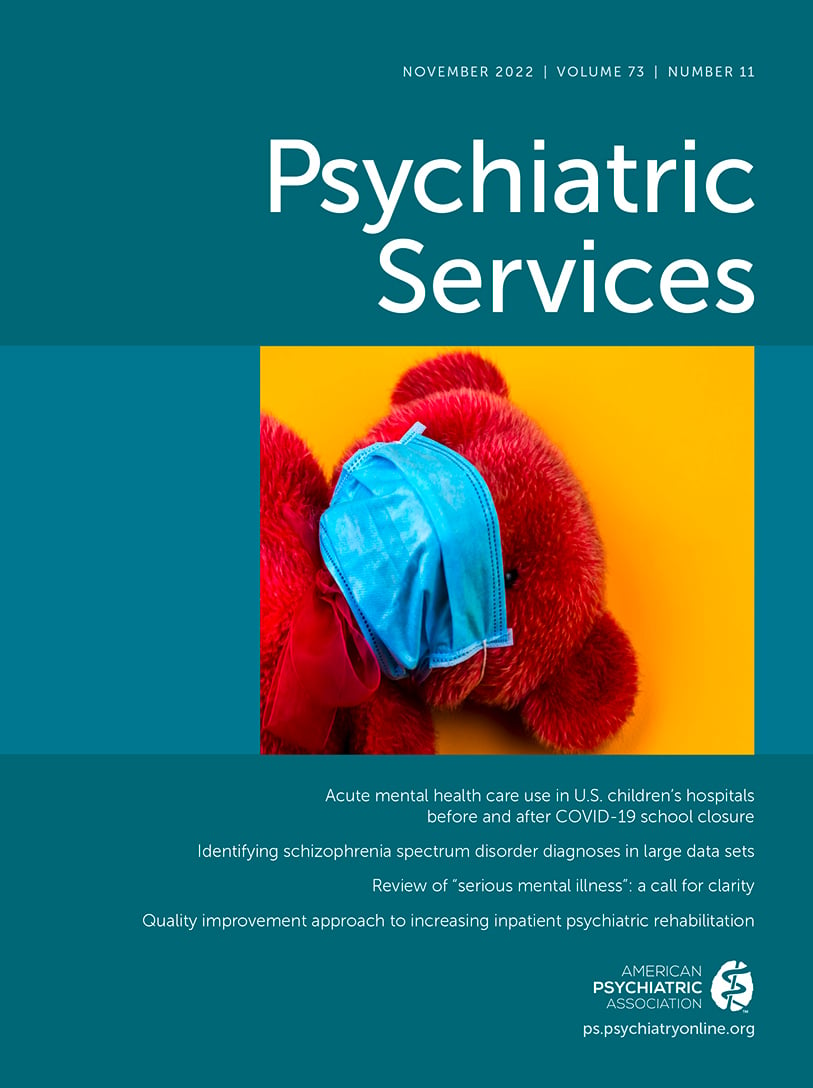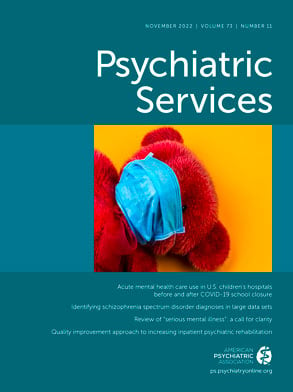Can current mental health facilities that are good at serving the needs of their patients get even better, using a proven, reputable system? Can those facilities then be challenged to enhance mental health care even further? I say yes. I’ve worked as a certified peer specialist for the past 7 years at Community Services Group, a mental health and intellectual and developmental disability provider in Pennsylvania that uses the CommonGround software system in its Williamsport peer-run decision support center (
1). During that time, I’ve witnessed the incredible difference CommonGround makes. We have three laptops loaded with the CommonGround software that are available for use in the waiting area of the psychiatric clinic, within the decision support center. While patients wait for their appointment, they can create a report with CommonGround to recap how they have been doing since their last appointment and what they would like to focus on during the upcoming appointment. I work in the decision support center, where I facilitate appointment set-up for individuals, introduce them to the CommonGround software, and assist when needed. The report identifies areas of concern and even has a free-text area for the individual to type what they would like the provider to focus on in their appointment. Those able to work more independently do so. After completing the report, I review it with the individual to provide support and the opportunity to visit the CommonGround Library to select videos, worksheets, personal medicine cards, or other resources to address the areas of concern on their report. I also print a copy of the report for the individual to take into the appointment. The provider and the individual review the CommonGround report and make a shared decision at the conclusion of the appointment, which includes a specific activity the individual will work on to stay well and aid in recovery (to be completed by the next appointment).
I’ve been honored to journey with many people throughout this time. I have been able to empathize with patients because I know what it is like to have a mental health diagnosis. I have been able to share my lived experience with mental health challenges and to kindle in others the hope for a full, meaningful life that is possible with mental health recovery. I have been able to provide education through a reputable software system created to amplify patients’ voices and address their needs and concerns. I use the software by talking about what is important to patients, sometimes navigating to helpful videos on related topics or assisting patients with a worksheet to help organize their thoughts before the appointment.
The time I spend with others at my place of work is sacred. One of the greatest tools that I have come across, which I utilize myself and share with others within CommonGround, is personal medicine (
2). Personal medicine is defined as anything you do that is not drinking, smoking, or taking a pill and that helps you to stay well. It is also what puts a smile on your face and what you are passionate about. What do you enjoy, and how does it help you? Both parts of that question are equally important. My personal medicine is taking a walk to clear my mind; noticing the colors in nature helps me stay in the present moment. For me, it’s also getting lost in a good book to learn about people and things outside my life and to help me get “unstuck” when repetitive thoughts hound my mind. It’s sitting down to diamond paint, which allows me to calm down by focusing on the patterns of the design and helps me to avoid dwelling on my worries. When possible, my personal medicine means kayaking to relax and feel the wind on my face, to enjoy the beauty of the water and its currents, and to help me minimize intrusive thoughts.
Personal medicine comes from within and is unique to each individual. This knowledge, and the experience of finding and utilizing my own personal medicine, has been a game changer for me. I found out a long time ago that just taking my medication—no matter how diligently—did not help me to feel my best. But discovering, using, and cultivating my personal medicine help me engage in life in ways that are meaningful and bring me joy.
In my experience with mental health challenges, I find that taking psychiatric medication affects the whole person. It affects physical health, mental health, emotional well-being, relationships, work, sleep, and eating habits. Meeting with a psychiatric care provider for an evaluation, telling your life story, receiving medication, and returning for 15-minute appointments don’t usually offer enough support for most to successfully live their best life and succeed in mental health recovery. The CommonGround software and the decision support center where I work provide a tremendous amount of education, support, and resources to patients, who respond well to the treasury of wellness resources available to them when they choose to engage. Yet, I assert that a psychiatric care clinic can be even better. With a few additions, clinical outcomes can go from “better” to “best.”
To take mental health care a step further, I propose a more holistic psychiatric care center, where the needs of the whole person would be met at a “one-stop shop.” The ideal psychiatric care center would contain not only the decision support center I have described, but also a nutritionist, therapists, a meditation room, a primary care provider, and a laboratory. Too lofty an ambition? I think not. Everyone likes the one-stop shop. This may sound outrageous and financially impossible, but so was walking on the moon.
A nutritionist is vital to help people to learn to nourish themselves in healthy ways. Often, individuals have limited resources and would appreciate education on the proper way to read labels and on how to be creative with healthy staple foods that are rich in nutrients. Having a nutritionist onsite would provide opportunities for individuals to learn and ask questions about eating right in order to improve their physical health—which, as I know, plays an important role in mental health.
Many individuals who take psychiatric medication are also involved in cognitive-behavioral therapy. I believe that therapists should be available onsite to guide individuals on their pathway to recovery and to living their best life. Having trusted professionals to help guide patients’ recovery, teach coping skills, and help them work through trauma and navigate life skills through better communication and, possibly, group sessions in the same center would be beneficial.
The availability of a meditation room would allow space for quiet, peaceful reflection, regardless of the individual’s religion or belief system. It could also serve as a place to meet with staff to learn breathing and grounding techniques or for guidance on allowing the mind and spirit to settle.
Including a primary care physician and a laboratory within the same location would encourage communication and foster relationships among all the professionals in the center. It seems to me that this should be required to provide the best care for an individual. Each person’s body comprises multiple parts, and treatment should therefore be more holistic. Communication between experts and patients should be expected and occur regularly. When laboratory tests are needed, they could be performed onsite, and the results could be provided to patients and shared (with permission) with the providers involved. Teamwork and person-centered care seem like the best pathway toward holistic care and would successfully promote recovery of the whole person.
Psychiatric care providers work in a variety of settings, including private practices, clinics, emergency departments, prisons, government, general and psychiatric hospitals, rehabilitation facilities, schools, and many other places. At these locations, psychiatric care providers prescribe medications to their patients, but there is often little opportunity for education, support, or resources to help patients successfully travel the road to wellness and recovery from their mental health challenges. If the holistic care center or one-stop shop isn’t possible yet, adding a decision support center to the psychiatric care setting would be a great first step toward improving services. Consider my message, which is based on experience, and let us strive to work together to find a more holistic common ground.

